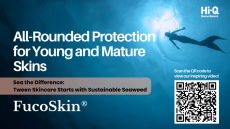Brand profile
Genomatica on building its brand in Asia-Pacific

Following the launch of its bio-based butylene glycol for cosmetics and personal care, we caught up with Damien Perriman, Senior Vice President at Specialty Chemicals at Genomatica on how the beauty and biotechnology conversation is evolving in 2018.
1. What has been Genomatica’s stand out moment to date in APAC?
Our partnership with Japanese chemical company, Daicel, has been a key development and we are very excited to have formed a collaboration with an existing innovator in the bio-based world.
Having a strong partner with existing relationships in the APAC market and who understands how business is conducted, enables us to learn about consumer thinking, demands and product desires by getting feedback, and helps us to implement this information in the production pipeline.
It is testimony of how compelling technology in this growing beauty arena is. This, in turn, creates an easier path to market for Brontide, our first bio-based beauty product formulation.
2. What considerations are there when developing processes for the APAC market?
The biggest considerations relate to odour and fragrance-free creations. This Fragrance-free element is an important part of ensuring quality standards are present.
While Europe and the US have similar approaches to voluntary certifications, in APAC, we do not see the same level of emphasis placed on obtaining these requirements.
Rather, we see the importance of material labels such as USDA bio-preferred and certification around natural-based sourcing. While this is relevant to the Asian market, on the whole, there are fewer certifications.
It is vital to build a compelling story about the novel benefits of Brontide, and this is achieved by following diligent trademarking conventions.
3. What are the challenges in manufacturing biological processes for a global audience?
The hardest part of this is answering what biological processes and fermentation processes actually are. Although fermentation is the oldest process technology on the planet, being able to communicate the differences between biological and synthetic chemicals is difficult.
To progress, the industry now needs to move past the initial inertia and take novel sustainable ingredients to encourage its contemporary applicability and relevance.
4. How big a part does the regulatory landscape play in this production?
With our partner, Daicel, we have completed work on ensuring the right registrations are in place in Europe, where manufacturing is important to us.
Overall the process required to enter into Japan has been seamless. While we have to look at the approval process including sourcing documentation and exploring how it is made and where its ingredients have come from, these ingredients are exactly the same, and there are only small differences that need to be clarified.
5. How does the digital and modern marketing landscape impact how you connect with your existing and prospective customers?
Digital is important when introducing ingredients and storytelling. Transparency in the supply chain is vital and as it is hard to have one-on-one conversations, it is crucial that stories are authentic, backed by science and strongly substantiated.
We currently use digital and print media, along with trade shows tell our brand story. However, approaching Brontide marketing is a little different as we want to ensure we communicate its true value and satisfy curiosity.
6. Do you plan to widen your presence in the APAC region?
In the next couple of months, we need to see how much demand there is in natural and sustainable glycol in APAC. We will be looking at what market segments create the most buzz and where Brontide is used in formulations.
We are looking at our entry strategy, but have a strong focus on continuing to grow.
7. What is next on the agenda?
We will be ramping up manufacturing in 2018 and preparing to serve the wider global market. After spending several years in challenging science. With a strong focus on outcomes, efficacy and providing a solution that is backed by scientists in San Diego, US, we are currently looking at our strategy over the next four years and concentrating on how our story resonates with the marketplace.
8. What do you hope Genomatica will have achieved this time next year?
Sharing his insights on how biotechnology in beauty is evolving in 2018, they buzzword is “novel ingredients”. As fermentation becomes responsible for producing special ingredients in a form and function that has not been seen before, this excites Perriman as “the fermentation tech delivers what previously the industry did not have”.
This ultimately enables developers to make a big impact on natural and sustainable ingredient development.
Multinationals is another area that is expected to see growth as the demand for sustainably- sourced products is getting stronger.
This now goes beyond natural products, and also focuses on what is good for consumers and the wider planet, Perriman added: “infinitely renewable and sustainable fashion is a string trend”.
To move forward, it is now up to suppliers to open up and show operational details that previously they were uncomfortable to reveal. The industry is now helping to encourage that conversation.


















